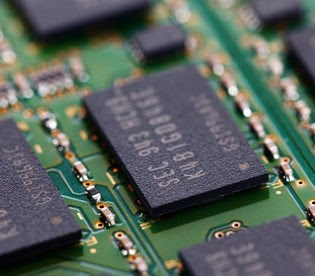RAM is the hardware location in a computer where the operating system, application programs, and data in current use are kept so that they can be quickly reached by the computer's processor. RAM is acronym used for Random Access Memory. RAM is much faster to read from and write to than most other kinds of storage in a computer (the hard disk, floppy disk, and CD-ROM).
When the user opens an application, it is loaded into RAM. RAM can be compared to a person's short-term memory and the hard disk to the long-term memory. The short-term memory focuses on work at hand, but can only keep so many facts in view at one time.
When the user saves a file and close the application, the file is written to the specified storage device, and then it and the application are purged from RAM.
Without RAM it becomes impossible to get very far, from the moment the PC is turned ON. The software applications installed on the computer depends largely on the RAM. It is responsible for holding the data while any application is running. Once the application is closed without saving, the data gets lost.
RAM is called "random access" because any storage location can be accessed directly. Externally, RAM is a chip that comes embedded in a personal computer motherboard with a variable amount of additional modules plugged into motherboard sockets. To add memory to the computer, just simply add more RAM modules in a prescribed configuration.
Whether it comes from permanent storage (the hard drive) or input (the keyboard), most data goes in random access memory (RAM) first. The CPU then stores pieces of data it will need to access, often in a cache, and maintains certain special instructions in the register.
The opposite of RAM is Serial Access Memory (SAM). SAM stores data as a series of memory cells that can only be accessed sequentially. If the data is not at the current location, each memory cell is checked until the needed data is found.
System RAM
A computer system comprises hardware and software components, aiming to offer a powerful computational tool. These systems play a crucial role across diverse domains, aiding us in numerous tasks. The prevalence of the internet has significantly bolstered the utilization of computers for information sharing and communication. Computer systems empower us to store, process, display, and transmit information. Even in a basic modern computer system, multiple programs are typically required to carry out various functions effectively.
The Most Popular Posts
-
The trash can has been a familiar presence on computer desktops starting with the early Macintosh systems. Unwanted files can be moved t...
-
Workgroup software, more commonly known as groupware, helps individuals work in teams by sharing information. Groupware can be divided into ...
-
An Enterprise Information Portal (EIP) serves as the digital hub of an organization, centralizing access to a wealth of information and res...
-
Spreadsheet is a simple worksheet consisting of rows and columns in which any data can be entered. It does calculations and other operation ...
-
The success of an online business is underpinned by several crucial elements that collectively foster growth and sustainability. Among these...
-
-
The *Auspicious Incident* (*Vaka-i Hayriye*) refers to the dramatic destruction of the Ottoman Janissary corps by Sultan Mahmud II on June 15, 1826. Thou...




